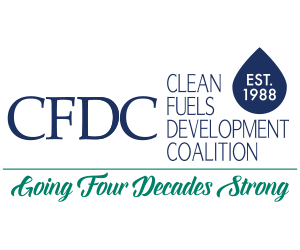CFDC News & Events
Higher Ethanol Blends
CFDC applauded the recent report by the state of Nebraska on the positive results from the state’s year long test of 30% ethanol blends in non flex fuel vehicles. The objective was “to determine adaptability, economic feasibility, and environmental impact of using E30” and according to Nebraska Governor Pete Ricketts, the final report on the demonstration indicates positive results on all counts.
CFDC Supports Challenge to SAFE Rule
CFDC joined with several other organizations to sign on to an Amicus Brief filed by the National Farmers Union challenging the rollback of fuel economy standards. The Brief argues that by failing to establish meaningful reductions the rule preserves entrenched petroleum industry interests at the expense of public health and the renewable fuel industry. The net effect of the Rule will be to increase the overall emissions from the US transportation industry and delay and disincentivize development and adoption of renewable fuels and cleaner, more efficient vehicles in exchange for claimed short-term cost savings, based on vague and dubious cost-benefit analyses and consumer preference assumptions.
CFDC Supporting Organization to the 2021 BBI Fuel Ethanol Workshop & Expo
The International Fuel Ethanol Workshop, the largest ethanol conference and expo in the industry, will be held July 13-15 in Minneapolis, Minnesota. CFDC is pleased to be among the many supporting organizations to this world class event, so spread the word. We’ll see you in Minneapolis!
CFDC’s Durante Receives High Octane Award
Recognizing his many decades of ethanol advocacy and policy work, Doug Durante received the 2020 International Fuel Ethanol Workshop’s High Octane Award, selected by a committee of past award recipients. A profile of Doug and the work of the CFDC is in a feature article in Ethanol Producer Magazine.
Reality EV: Let’s Not Overlook Biofuels
The widespread introduction of electric vehicles as a means of reducing carbon emissions presents a far greater challenge than the public is being led to believe, according to new research by the CFDC.
This conclusion is presented in Reality EV, a new Issue Brief released here this week. Reality EV’s research explains the consumer/taxpayer, infrastructure, and environmental constraints single fuel source electric vehicles (EVs) must overcome.
Issue Brief principal author Burl Haigwood of CFDC said this research is not intended to dismiss the potential contribution of EVs but rather to put them in perspective. In doing so it makes it critical to recognize the role biofuels can play to provide much more immediate and quantifiable benefits.
Click for more information.
Biofuels International Magazine: Obstacles must be removed to aid the development of biofuels, September 2019.
Moving beyond the RFS, Douglas A. Durante, executive director of the Clean Fuels Development Coalition
The global biofuels community is without a doubt watching the developments in the US with the Renewable Fuel Standard (RFS) and might be understandably confused. How is a program that was passed by the US Congress and supported by Democrats and Republicans alike, and happily signed into law by two different Presidents, so controversial? (read full article here).
CFDC’s VanderGriend and Durante raise the Alarm: Houston, We have a Problem.
An article by CFDC Member Dave VanderGriend and Director Doug Durante published in the Biofuels Digest was in response to the media coverage, both national television and print media, of the disastrous spill of 11,276 barrels of benzene-based octane-enhancer reformate in the Houston ship channel. The article made the clear point that reformate was a more genteel name for toxics, including benzene, a known carcinogen. Houston newspaper articles downplayed the heath hazards of the spill and petroleum industry representatives pointed to a Center for Disease Control and Prevention (CDC) report that reviewed thousands of air monitoring samples for a range of toxics. The report found that In the beginning, tests detected a benzene reading 14 times higher than the level of concern for short-term health effects about seven hours after the collision. “This reading wasn’t replicated, however, and no high-level detections were made after that.” Water is one of the most effective carriers of non soluble compounds and these carcinogens could be miles away. Was that an amazing clean up – or coverup?#Gasolinegate #SafeGasolineCampaign. Clean octane in the form of renewable ethanol can replace these carcinogens refiners use to increase octane and the public needs to understand the health hazards they are exposed to from consumer gasoline. The American Petroleum Institute stated in Congressional testimony as far back as 1948 that the safe threshold for benzene was zero. Since 1948 every health organization has classified benzene as a known human carcinogen – including the EPA.
CFDC Calls on Particulate Panel to Recognize Dangers of Mobile Source Toxics
Washington, D.C., October 10, 2019: The Clean Fuels Development Coalition (CFDC) today applauded the efforts of a disbanded EPA advisory panel on particulate pollution as they reconvene to continue their work, despite the lack of government support.
With a focus on particulate matter, the group of distinguished researchers, scientists, and other experts has expressed concerns over inadequate particulate controls, particularly from fossil fuels. CFDC responded to a call for comments by urging the group to recognize the critical role gasoline emissions play as the predominant source of ultrafine pm.
Statement from the Clean Fuels Development Coalition: EPA Decision to Issue RFS Waivers Bad for Public Health & The Environment
“The Administration’s decision to issue Renewable Fuel Standard waivers and therefore remove low-carbon, low-toxin biofuels is a significant step backwards and damaging to our environment and public health. Studies show that higher blends of biofuels in gasoline can reduce air pollution and greenhouse gas pollution and save Americans money at the pump. Yet, again the EPA is choosing to side with the oil industry at the expense of the health and well-being of the American people.” ~ Doug Durante, Executive Director of Clean Fuels Development Coalition
New Global Analysis by Federal and State Scientists Pinpoints Gains In Corn Field Carbon Retention
Study Also Finds Risks of Removing Crop Residues
Washington, D.C., July 22: A new analysis of the results of thousands of soil samples taken around the world has found that, on average, well-managed cornfields increased their stocks of carbon by an annual rate of .41 metric tons per hectare compared to baseline values. This has major, positive implications for corn ethanol according to CFDC analysis which indicates one acre of corn, before it is even used for ethanol, offsets the annual Co2 CO2 emissions of a conventional automobile by 1/3.

Durante and Governor Ben Nelson of Nebraska.
